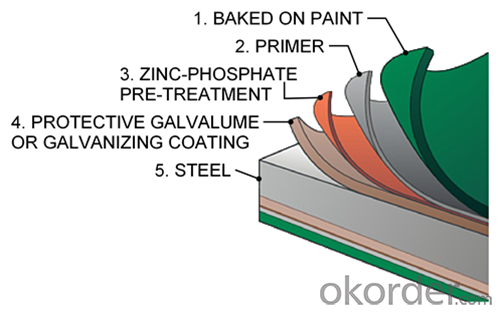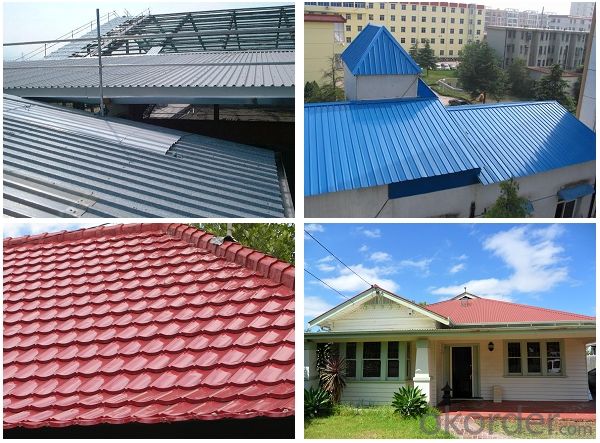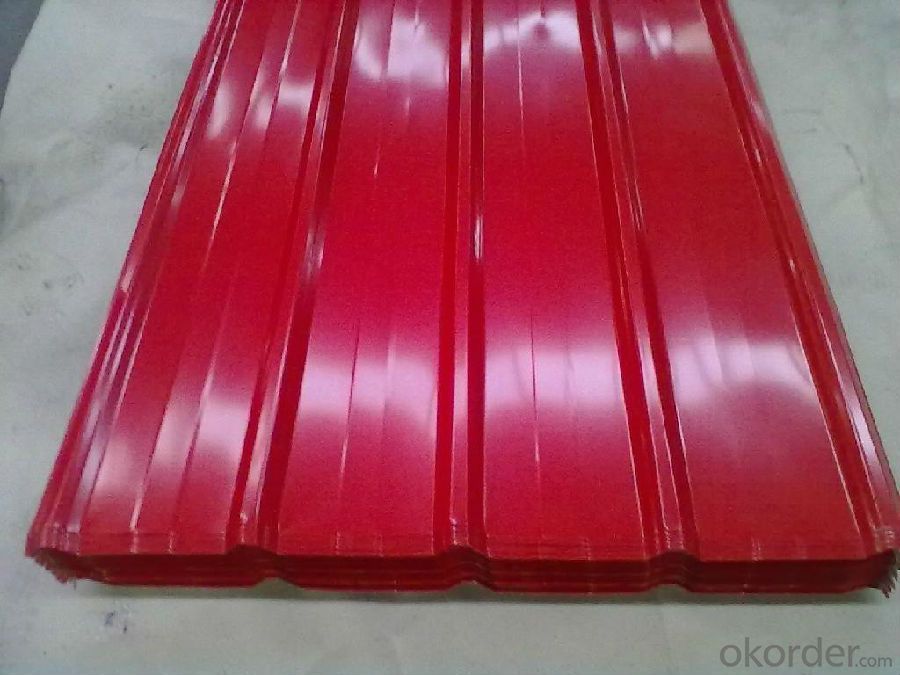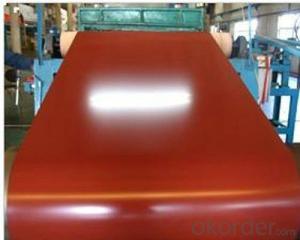Pre-painted rolled Steel Coil for Construction Roofing Constrution
- Loading Port:
- Tianjin
- Payment Terms:
- TT OR LC
- Min Order Qty:
- 25 m.t.
- Supply Capability:
- 25 m.t./month
OKorder Service Pledge
OKorder Financial Service
You Might Also Like
Structure of Prepainted Rolled steel Coil for Construction Roofing

Description of Prepainted Rolled steel Coil for Construction Roofing
Prepainted Rolled steel Coil is a kind of coated steel coil/sheet. With the cold rolled steel of different strength and thickness as substrate, it is produced through applying Al-Zn coat on both faces by hot dip process. In its coating, Al accounts for about 55%, Si 1.6%, while the remaining is Zn. Aluminum zinc coils enjoys both the physical protective feature and durability of Al and the electrochemical protective property of Zn. And its surface has bright silver color and regular embossed-like figure, which are highly decorative.
Main Feature of Prepainted Rolled steel Coil for Construction Roofing
1.Corrosion resistance: It mainly depends on the aluminum protection. When the zinc being worn, the aluminum will form a dense layer of aluminum oxide, resist corrosion material to prevent further corrosion inside.
2. Heat resistance: Aluminum zinc alloy steel sheet has excellent heat resistance, can withstand high temperatures over 300 centigrade, and is similar with aluminized steel high temperature oxidation resistance. It often used in chimney pipes, ovens, fluorescent lighting device and the device cover.
3. Heat reflective: Galvanized steel plate heat-reflective high rate is twice as galvanized steel, often used to make insulation materials.
4. Economy: Because density of 55% AL-Zn is smaller than the density of Zn, so in the same weight and thickness of Galvanized zinc layer, aluminum-zinc steel plate is larger area more than 3% of galvanized steel sheet.
Applications of Prepainted Rolled steel Coil for Construction Roofing
1. Construction and building: roofing; ventilating duct; handrail; partition panel;etc.
2. Electric appliance: refrigerator; washing machine; refrigerator; DVD;etc.
3.Transportation: oil tank; road sign; etc.
4.Agriculture:barn; etc.
5.Others:vending machine; game machine; etc.


Specifications of Rolled steel Coil for Construction Roofing
Product | Prepainted Rolled steel Coil for Construction Roofing |
Material Grade | SGCC / SGCH / DX51D+AZ, etc |
Thickness | 0.2-3.0mm |
Width | 600-1500mm |
Tolerance | Thickness: +/-0.02mm , Width:+/-2mm |
Zinc-coating | AZ40-150g/m2 |
Technique | Raw material: Hot rolled steel coil --> Cold rolled_>hot dipped galvalume |
Surface | Dried, Chromated, Unoiled |
Spangle | Regular spangle , small spangle, zero spangle |
ID | 508MM |
Coil weight | 10MT max |
Export package | Cardboard inner sleeves, Waterproof paper, galvanized steel covered and steel strip packed |
FAQ of Prepainted Rolled steel Coil for Construction Roofing
We have organized several common questions for our clients,may help you sincerely:
1. What is the minimum order quantity ?
Our MOQ is 50mt for each size. And we will consider to give more discount if you make big order like 1000 tons and more. Further more, the more appropriate payment term your offer the better price we can provide.
2. How long can we receive the product after purchase?
Usually within thirty working days after receiving buyer’s advance payment or LC. We will arrange the factory manufacturing as soon as possible. The cargo readiness usually takes 15-25 days, but the shipment will depend on the vessel situation.
3. How to guarantee the quality of the products?
We have established the international advanced quality management system,every link from raw material to final product we have strict quality test;We resolutely put an end to unqualified products flowing into the market. At the same time, we will provide necessary follow-up service assurance.
- Q:How do steel coils contribute to energy efficiency in buildings?
- Steel coils contribute to energy efficiency in buildings in several ways. Firstly, steel coils are used in the construction of insulated panels and roofs, which provide effective thermal insulation. This insulation helps to reduce heat transfer, keeping the interior of the building cool in hot weather and warm in cold weather. Additionally, steel coils are often used in the manufacturing of energy-efficient windows and doors. These windows and doors are designed to minimize heat loss or gain, thereby reducing the need for heating or cooling systems and saving energy. Furthermore, steel coils are also utilized in the production of energy-efficient appliances, such as refrigerators and air conditioners, which consume less electricity while providing the same level of performance. Overall, the use of steel coils in building construction and appliances contributes to improved energy efficiency, reducing energy consumption and promoting sustainability.
- Q:I'm just wondering what the best steel would be for an edc/hunting knife that could put up with alot of abuse.
- That one they use for the Army Combat Knife, I forgot what its called but Its a good one if your going to use it for camping.
- Q:How are steel coils inspected for surface cleanliness during processing?
- Steel coils are inspected for surface cleanliness during processing through various methods such as visual inspection, magnetic particle inspection, and ultrasonic testing. These methods help identify any contaminants, defects, or surface irregularities that may affect the quality of the steel coils.
- Q:is surgical steel or sterling silver belly button rings better for you? surgical is really cheap so its sketch and i justt dont want it to mess up
- Sterling silver is not meant for extended wear in body piercings, and should NEVER be worn in fresh or unhealed piercings - the silver will tarnish, and the tarnish can be deposited into your skin which causes it to turn gray or black. Silver can also cause allergic reactions for those who have nickel allergies. So it's okay to wear for a special occasion in a healed piercing, but has lots of nasty side effects if left in too long. As for the surgical steel: not all SS body jewelry is created equal! Lots of cheap steel body jewelry is made out of 316L Stainless steel, which is the minimum requirement for steel worn in healing/fresh piercings. Some people can wear this type of steel, but it can (and does) irritate and cause allergic reactions for others. Personally, I will only wear 316LVM ASTM F-138 Implant Grade Steel, which is the same type of material that doctors use when they put pins and plates in your body during surgery. It is the highest quality steel you can get, and will usually cost a bit more, but as someone with sensitive skin I am not willing to risk getting an allergic reaction from sub-par jewelry. Also, implant-grade jewelry is most often INTERNALLY-THREADED, which means that the threads are concealed inside the jewelry and do not come in contact with your skin. EXTERNALLY-THREADED jewelry has the threads on the outside, and inserting it into your piercings is pretty much the equivalent of dragging a screw through your navel. Whatever grade of steel you decide to go with, make sure the threads are on the inside!
- Q:What is the process of recycling steel coils?
- The process of recycling steel coils involves several steps to ensure the maximum utilization of the material and to minimize waste. Firstly, steel coils are collected from various sources, including industrial manufacturing facilities, construction sites, and scrap yards. These coils are then transported to a recycling facility where they undergo a thorough inspection to assess their quality and determine the appropriate recycling method. Next, the steel coils are cleaned to remove any contaminants such as dirt, oil, or paint. This is typically done using chemical agents or mechanical processes, depending on the level of contamination. Cleaning the coils is crucial as it ensures the quality of the recycled steel. After cleaning, the coils are shredded or sheared into smaller pieces to facilitate further processing. This step helps to increase the surface area, making it easier to separate the steel from other materials that might be present in the coils. Once the coils are broken down into smaller pieces, they go through a process known as magnetic separation. This involves passing the steel pieces through a magnetic separator that uses powerful magnets to attract and separate the ferrous steel from non-ferrous materials like aluminum or plastic. This separation is essential as it ensures the purity of the recycled steel. The separated steel pieces are then melted in a furnace at extremely high temperatures. This melting process not only removes any remaining impurities but also allows the steel to be molded into various shapes and forms, depending on the intended application. After melting, the molten steel is poured into molds or cast into ingots to solidify. These ingots can be further processed and transformed into new steel products or used as raw material in various industries. Throughout the recycling process, the steel coils are subjected to quality control measures to ensure that the resulting recycled steel meets the required specifications and standards. This includes conducting chemical analyses and mechanical tests to verify the strength, composition, and overall quality of the recycled steel. In conclusion, the process of recycling steel coils involves collecting, cleaning, shredding, separating, melting, and molding the steel to produce new products or raw material. This process not only helps to conserve valuable resources but also reduces the environmental impact associated with traditional steel production.
- Q:What is the lifespan of a steel coil?
- The lifespan of a steel coil can vary depending on various factors such as the quality of the steel, the conditions it is exposed to, and how well it is maintained. However, on average, steel coils can last anywhere from 10 to 30 years.
- Q:I plan to buy a bushcraft knife ..The blade made up by damascus steel.My question is ,is damascus steel is very strong ?
- So, there isn't a good answer to your question, because Damascus doesn't describe the actual materials properties of the steel, rather the mechanical construct of the steel. For example: A very common Damascus steel is to layer L6 with 1080 high carbon steel and forge weld the layers together to make a blank, anneal it, then grind it into your blade and heat treat it. (Massive over simplification) That type of Damascus steel is going to be a bit softer than one of the super high carbon exotics, but will be tougher in terms of ability to flex without taking a set, and not chipping out if the edge hits something hard. (assuming it is heat treated well) - edge between RC56 - 58 typically. Another common Damascus steel is layers of VG-10 steel and VG-1 steel also welded together, with the billet then annealed, ground, and heat treated. In this case, because you are using stainless steels you will get a much harder edge - RC 60 - 62 typically. It will have better toughness than plain VG-10, but certainly nowhere near what you can get out of L6 or 52100 or something of that sort. Generally, for a bushcraft knife you typically want something like the first type of Damascus because you are looking for a more all purpose tool, and typically a larger knife. The only problem is that in the bush the first types of steel typically rust. The second type is made up of stain resistant steels and will hold up better. So, this brings me around to - why exactly do you want a Damascus blade on your knife? Are you already looking at one you like? Thinkingblade
- Q:This EN10025 S355JR is a European code for steel, of which the properties can be found here.
- *EN 10 025 S355JR/JO is comes under structural steel catagories. Equivalent standard is-ASTM A 572 Gr 50. -Above areHigher strength micro-alloyed steel. -The above-mentioned structural steel grades may be welded using any of the standard metal arc and resistance welding processes, usually without any special precautions.
- Q:How are steel coils coated to prevent corrosion?
- Steel coils are often coated to prevent corrosion through a process called galvanization. This involves applying a layer of zinc to the surface of the steel coils, which acts as a protective barrier against moisture and other environmental elements. The zinc coating effectively prevents rust and corrosion from forming on the steel surface, extending the lifespan of the coils.
- Q:What are the dimensions of steel coils used in the construction equipment industry?
- The dimensions of steel coils used in the construction equipment industry can vary depending on the specific application and requirements. However, there are common standard dimensions that are often used. Steel coils used in the construction equipment industry typically have a width ranging from 600mm to 2000mm. The thickness of these coils can range from 0.5mm to 25mm or even higher, depending on the intended use and structural requirements. The weight of steel coils used in construction equipment industry can vary significantly, ranging from a few hundred kilograms to several tonnes. The weight is typically determined by the dimensions and thickness of the coil, as well as the specific grade and type of steel being used. It is important to note that these dimensions are not fixed and can be customized based on the specific needs of the construction equipment industry. Manufacturers and suppliers can provide steel coils in various dimensions to meet the specific requirements of construction equipment manufacturers and contractors.
1. Manufacturer Overview |
|
|---|---|
| Location | |
| Year Established | |
| Annual Output Value | |
| Main Markets | |
| Company Certifications | |
2. Manufacturer Certificates |
|
|---|---|
| a) Certification Name | |
| Range | |
| Reference | |
| Validity Period | |
3. Manufacturer Capability |
|
|---|---|
| a)Trade Capacity | |
| Nearest Port | |
| Export Percentage | |
| No.of Employees in Trade Department | |
| Language Spoken: | |
| b)Factory Information | |
| Factory Size: | |
| No. of Production Lines | |
| Contract Manufacturing | |
| Product Price Range | |
Send your message to us
Pre-painted rolled Steel Coil for Construction Roofing Constrution
- Loading Port:
- Tianjin
- Payment Terms:
- TT OR LC
- Min Order Qty:
- 25 m.t.
- Supply Capability:
- 25 m.t./month
OKorder Service Pledge
OKorder Financial Service
Similar products
New products
Hot products
Related keywords






























